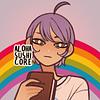You need to sign in or sign up before continuing.
Take a photo of a barcode or cover
Vivian Gornick becomes a flaneur in her own city and relates priceless anecdotes of her encounters along her walks, with strangers and with friends. It is a prize for anyone who loves good writing, musing on friendship, culture, identity and New York City.
New Yorkers can be so provincial.
This book reads as if it's waiting for a posthumous plaudit from Edmund Wilson.
This book reads as if it's waiting for a posthumous plaudit from Edmund Wilson.
This is a quite short and sweet autobiography, based on thoughts, not on chronology, which serves the author right. Her quite recent interview in The Paris Review serves this book well.
Gornick's style is terse and straightforward, which often serves her diary-ish entries well:
A lot of her reflections are mini-monographs, like counts one does most often not write down:
There are quite a few quotes here, which isn't at all wrong; I mean, they serve a purpose as well as obviously having meant something to Gornick:
All in all, I think this memoir - mind you, it's not an autobiography - should have been reined in more, but then again, that would probably have steered the reader from Gornick's style, which is quite rewarding.
Gornick's style is terse and straightforward, which often serves her diary-ish entries well:
As the orchestra tuned up and the lights dimmed in the soft, starry night, I could feel the whole intelligent audience moving forward as one, yearning toward the music, toward themselves in the music: as though the concert were an open-air extension of the context of their lives. And I, just as intelligently I hoped, leaned forward, too, but I knew that I was only mimicking the movement. I’d not yet earned the right to love the music as they did. Within a few years I began to see it was entirely possible that I never would.
A lot of her reflections are mini-monographs, like counts one does most often not write down:
Before I was thirty-five I had been as much bedded as any of my friends, and I had also been twice married, twice divorced. Each marriage lasted two and a half years, and each was undertaken by a woman I didn’t know (me) to a man I also didn’t know (the figure on the wedding cake).
There are two categories of friendship: those in which people enliven one another and those in which people must be enlivened to be with one another. In the first category one clears the decks to be together; in the second one looks for an empty space in the schedule. I used to think this distinction more a matter of one-on-one relationships than I now do. These days I look upon it more as a matter of temperament. That is, there are people who are temperamentally inclined to be enlivened, and others for whom it is work. Those who are inclined are eager to feel expressive; those for whom it’s work are more receptive to melancholia. New York friendships are an education in the struggle between devotion to the melancholy and attraction to the expressive. The pavements are filled with those longing to escape the prison sentence of the one into the promise of the other. There are times when the city seems to reel beneath its impact.
There are quite a few quotes here, which isn't at all wrong; I mean, they serve a purpose as well as obviously having meant something to Gornick:
“Every man alone is sincere,” said Ralph Waldo Emerson. “At the entrance of a second person, hypocrisy begins … A friend, therefore, is a sort of paradox in nature.”
All in all, I think this memoir - mind you, it's not an autobiography - should have been reined in more, but then again, that would probably have steered the reader from Gornick's style, which is quite rewarding.
Flaneur: An idler, a person who strolls aimlessly through the streets of the city.
Gornick is a flaneur and her prose is a beautiful composite of what she has seen and heard while walking the sidewalks of New York City.
An odd book, but I felt compelled to continue the walk with her.
Gornick is a flaneur and her prose is a beautiful composite of what she has seen and heard while walking the sidewalks of New York City.
An odd book, but I felt compelled to continue the walk with her.
Gornick writes a love letter to the city of New York. She writes about the city and its inhabitants. Strangers interacting: arguing, befriending, tolerating, etc. She writes about herself: she's unmarried, no children, growing old, loving her friends, nostalgic, a feminist, an odd woman. It's written in snippets so it reads like a journal. She writes about other people, people who have impacted her deeply or who have shaped her as a person.
An engaging memoir about Gornick's abiding love for New York City, walking, literature, and a cherished friendship. Her observation of this relationship, and perhaps any intimate relationship, is keen:
"My friendship with Leonard began with me invoking the laws of love: the ones that involve expectancy. "We are one," I decided shortly after we met. "You are me, I am you, it is our obligation to save each other." It took years for me to realize this sentiment was off the mark. What we are, in fact, is a pair of solitary travelers slogging through the country of our lives, meeting up from time to time at the outer limit to give each other border reports."
The book itself is a sort of border report, gratefully received by this reader.
"My friendship with Leonard began with me invoking the laws of love: the ones that involve expectancy. "We are one," I decided shortly after we met. "You are me, I am you, it is our obligation to save each other." It took years for me to realize this sentiment was off the mark. What we are, in fact, is a pair of solitary travelers slogging through the country of our lives, meeting up from time to time at the outer limit to give each other border reports."
The book itself is a sort of border report, gratefully received by this reader.
I wanted to love this book, I really did. So many people I value had said such good things about Gornick, shared lovely quotes and waxed lyrical on her writing. Maybe I was expecting too much, but this just wasn't as good as I wanted it to be.
There were kernels of glorious prose in here. I found the sections about other things - other lives, other books, whatever - to be mostly incredibly interesting and quite well-written. Everything about Gornick herself felt annoying though. Too much, too intimate, for my first book of hers. And at times, better suited to a private journal, honestly.
I don't know. Maybe I thought about reading this too much before I read it, maybe you'll like it more. But too much of it missed the spot for me.
There were kernels of glorious prose in here. I found the sections about other things - other lives, other books, whatever - to be mostly incredibly interesting and quite well-written. Everything about Gornick herself felt annoying though. Too much, too intimate, for my first book of hers. And at times, better suited to a private journal, honestly.
I don't know. Maybe I thought about reading this too much before I read it, maybe you'll like it more. But too much of it missed the spot for me.
It feels like a waste time to read this book. It started off witty and funny, but then it just turned into something melodramatic. The author called the cops on a black man on the bus just because she told him to lower his voice and he called her a bitch. AND she wrote down the incident and sent it to the Times. What is this? The worst part is you don't know if anything is real or fake or somewhere in between because the first page disclaimer says things may have been altered. Great. Then don't call it a memoir I kid you not.
There are many yikes moments and I feel very uncomfortable after reading this book.
There are many yikes moments and I feel very uncomfortable after reading this book.
I picked up this book the first few weeks of my senior year in college and (shamefully) left it to collect dust on my desk. After 1 year of neglect, I decided to give it another chance. To have left this piece of literature unread now seems wholly egregious because the advice and adages this book provided proved invaluable.
This book is a memoir, straight and through. The writing is scattered, the narrator's voice exudes with passion and wisdom, and through the madness of the anecdotes, this book was exactly the dose of realism I needed. There exists such rawness throughout the pages! The way the author, Vivian Gornick describes love, the failures of relationships, and how she has dealt with adulthood in her 60 years of age is simply splendid. Her roots with radical feminism was also deeply relatable, and her coming into terms with what exactly that means and how it translates into her lifestyle, was extremely helpful and eye-opening.
There were so many memorable quotes that described the monotony of life, that this mere dichotomy of topics was made entertaining to read. I was so refreshed reading this story of a woman who feels affirmed by her independence and who is enamored with the city and all its happenings.
Somehow, it makes sense that I read this as a post-grad because adulthood is alien and this book made it less obfuscated than it really seems.
Please read!
This book is a memoir, straight and through. The writing is scattered, the narrator's voice exudes with passion and wisdom, and through the madness of the anecdotes, this book was exactly the dose of realism I needed. There exists such rawness throughout the pages! The way the author, Vivian Gornick describes love, the failures of relationships, and how she has dealt with adulthood in her 60 years of age is simply splendid. Her roots with radical feminism was also deeply relatable, and her coming into terms with what exactly that means and how it translates into her lifestyle, was extremely helpful and eye-opening.
There were so many memorable quotes that described the monotony of life, that this mere dichotomy of topics was made entertaining to read. I was so refreshed reading this story of a woman who feels affirmed by her independence and who is enamored with the city and all its happenings.
Somehow, it makes sense that I read this as a post-grad because adulthood is alien and this book made it less obfuscated than it really seems.
Please read!
I really loved this - it was a brief meditation on a life lived as a feminist in the 20th century, the intersection of the city and loneliness, and ties to historical arts figures as well as random encounters.






